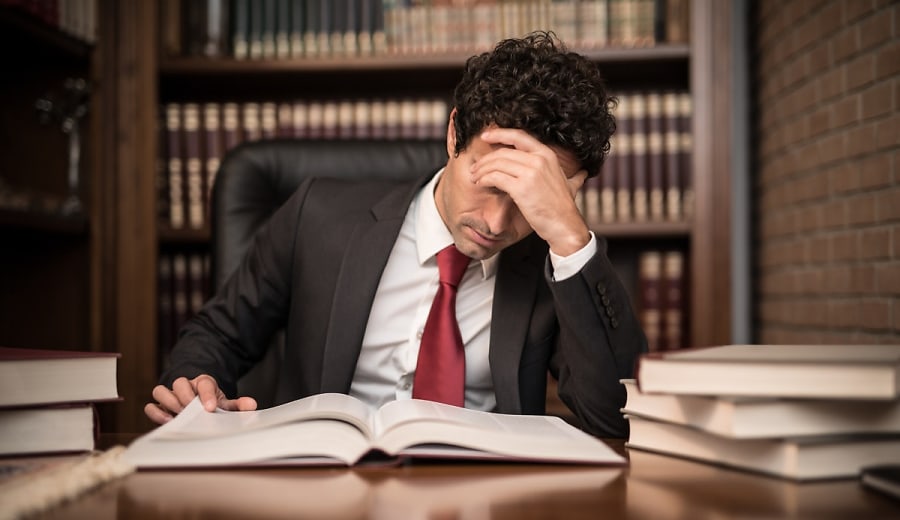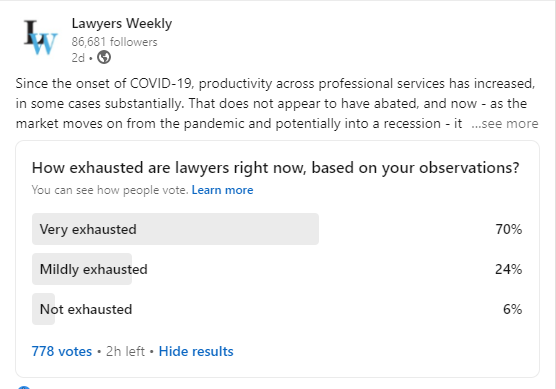Aussie lawyers are (almost certainly) exhausted. What can be done?
Exhaustion is shaping up to be a significant issue in the legal profession in the current climate, with some causative factors stemming from the COVID-19 pandemic and in the face of a potential economic downturn.

Exhaustion and burnout is an issue for lawyers that is garnering increasing public attention.
Work health and safety changes have also been a central topic of discussion in the public sphere and political arena, and legislative changes have come into effect in recent months, in response to many raising concern over the issue of mental health issues exacerbated by workplace structures.
Following the coverage, and against the backdrop of ongoing market uncertainty coming out of the pandemic and potentially in the face of a national recession, Lawyers Weekly asked its audience, via a LinkedIn poll, how exhausted lawyers are right now — with options ranging from not exhausted, to mildly exhausted to very exhausted.
At the time of filing, the poll results were as follows:

The poll showed that 70 per cent of the 724 respondents observed that lawyers were very exhausted, 24 per cent felt that lawyers were mildly exhausted, and merely 6 per cent thought that lawyers were not exhausted.
The poll was not a scientific study, yet it gives a glimpse into the extent to which lawyers are experiencing exhaustion.
The results of the poll were reflected in the understanding of several mental health professionals that Lawyers Weekly spoke with.
Dr Eloise Crush, insights lead and psychologist at Positive Group, has worked with one of the largest law firms in Australia for years.
Dr Crush said that “over recent years, we’ve seen an increase in the prevalence of anxiety, depression, burnout, and general exhaustion amongst professionals”.
“Stress is a major predictor of negative psychological health experiences and burnout,” she explained. “The particularly high levels of stress seen in law firms compared to other industries suggests the legal profession requires reflection and solutions for its people.”
Associate professor Greg de Moore, director of clinical services and mental mealth at Western Sydney Local Health District, also spoke to Lawyers Weekly on the topic.
Burnout impacts lawyers both personally and professionally, he explained; they feel completely spent, mentally, emotionally, and physically, and can experience symptoms varying in intensity up to major depression and thoughts of self-harm.
It also affects work performance, efficiency and satisfaction, and it can result in them leaving the workforce, Mr de Moore explained.
The nature of the issue
Dr Crush characterised the nature of the issue, discussing why exhaustion is so prevalent in lawyers.
She noted that the legal profession holds unique workplace demands and environments.
“Law poses a challenge as it is built on a billable hours model, with a system that reinforces and rewards working longer hours among high-performing individuals with perfectionist tendencies,” she explained.
“The industry is client-driven, meaning deadlines are externally determined; in turn, this creates constant uncertainty accompanied by a lack of control.
“These factors, alongside longer working hours, are a recipe for employees feeling they ‘can’t cope’ and cause conflict between their personal and working lives,” she explained.
“This also impacts non-client facing staff, as the focus on clients and deadlines puts pressure on the whole organisation, due to the pace of work and behaviours it drives,’ Dr Crush said. “Culturally, this creates a pressure cooker.”
Mr de Moore noted that increased workload is another factor exacerbating the issue.
“The impact of COVID is that a lot of things that would have normally happened in an organisation, small or large, were suspended for three years, and organisations are trying to catch up on things that they would have done,” he illuminated.
“What you’ve now got is a workforce that is uncertain about the future, being instructed by the organisation to catch up on a whole lot of work that missed out on.
“There’s a lot more work and higher expectations than before.”
According to Coaching Advocates co-founder and director Lara Wentworth, COVID-19 caused a unique challenge with working from home, where it became difficult to compartmentalise work and home.
“The economic downturn is placing lawyers under financial pressure, especially those in smaller firms who rely on cash flow,” she said.
“Those lawyers are working extra hard on winning work and increasing their billings to meet financial demands.”
Lawyers are finding themselves in a difficult position, where they have pressures to work in a cost-efficient manner for clients, while meeting financial targets and key performance indicators (KPIs) set by their firm, she noted.
We are also seeing “poor leadership skills and an inability to motivate and value staff”, Ms Wentworth stated.
Employer response
“How can employers respond to this?” Lawyers Weekly asked.
Dr Crush responded: “There are two pathways through which firms can look to mitigate stress and reduce burnout: one, working with individuals to build up their own skills to assist in managing their own stress levels, and two, build protective factors into the workplace environment.”
"This highlights the need for firms to continue to focus on their own environment and culture, and to think about how they can build protective factors into the DNA of their organisation, to help mitigate stress for all.
"Human connection is the most significant protective factor," she said, "Supportive, collaborative workplaces – top down, and led by leadership – enable people to better manage their stress despite challenging workloads."
Mr de Moore said: “We want a workforce that’s efficient, but we also want a workforce in which they feel valued, and looked after, and respected.”
“Managers need to recognise this is a real phenomenon.
“That is a first step, which doesn’t always happen, because everyone’s so hell-bent on steaming forward and pursuing whatever organisation goals ahead, but in the process that will crush people.”
“Upper-level management needs to genuinely engage workers, and make sure that people get whatever requisite leave and time off, and that it’s done willingly, and not begrudgingly,” he said.
Ms Wentworth weighed in: “Employers need to be cognisant of the decreasing energy levels in their teams and to create supportive and safe spaces for their team members.”
“Leaders must pay attention to their staff and become flexible in how they communicate, delegate work and motivate their staff,” she noted.
“In short, they need to improve their leadership skills.”